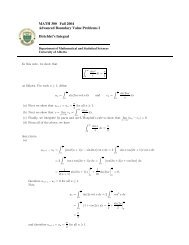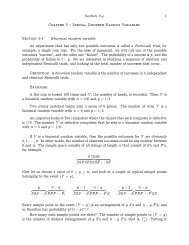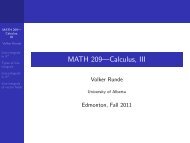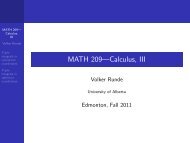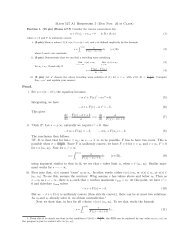Math 411: Honours Complex Variables - University of Alberta
Math 411: Honours Complex Variables - University of Alberta
Math 411: Honours Complex Variables - University of Alberta
Create successful ePaper yourself
Turn your PDF publications into a flip-book with our unique Google optimized e-Paper software.
• if w �= z:<br />
�<br />
�<br />
|g(w,z)−g(z0,z0)| = �<br />
f(w)−f(z)<br />
� −f<br />
w −z<br />
′ �<br />
�<br />
(z0) �<br />
�<br />
� �<br />
�<br />
= �<br />
1<br />
�w−z<br />
Thus, g is continuous.<br />
Next, define<br />
[f<br />
[z,w]<br />
′ (ζ)−f ′ (z0)]dζ<br />
�<br />
h0: D → C, z ↦→<br />
γ<br />
�<br />
�<br />
�<br />
�<br />
g(ζ,z)dζ.<br />
69<br />
≤ sup |f<br />
ζ∈{[z,w]}<br />
′ (ζ)−f ′ (z0)|≤ ǫ.<br />
We claim that h0 is holomorphic. It is easy to see that h0 is continuous. To see that<br />
it is indeed holomorphic, we shall show that it satisfies the Morera condition. Let<br />
∆ ⊂ D be a triangle. For fixed ζ ∈ {γ}, the function<br />
D → C, z ↦→ g(ζ,z)<br />
isholomorphicasaconsequence<strong>of</strong>Riemann’sRemovabilityCondition. Goursat’s Lemma<br />
thus yields<br />
�<br />
g(ζ,z)dz = 0<br />
∂∆<br />
for each ζ ∈ {γ}. As a consequence, we find<br />
�<br />
0 =<br />
�<br />
=<br />
�<br />
=<br />
γ<br />
∂∆<br />
∂∆<br />
so that h0 is holomorphic as claimed.<br />
Define<br />
��<br />
∂∆<br />
��<br />
γ<br />
�<br />
g(ζ,z)dz dζ<br />
�<br />
g(ζ,z)dζ dz<br />
h0(z)dz,<br />
�<br />
h1: extγ → C, z ↦→<br />
γ<br />
f(ζ)<br />
ζ −z dζ.



